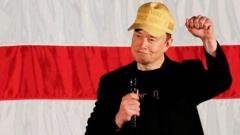Tech billionaire Elon Musk has ignited heated debate after announcing a giveaway of $1 million a day to random voters in crucial swing states leading up to the US presidential election on November 5. The program, which is tied to a petition supporting the US Constitution, is part of Musk's campaign group, AmericaPAC, aimed at bolstering Republican nominee Donald Trump's candidacy. At a recent town hall event in Pennsylvania, Musk presented the first lottery-style check, followed by another giveaway that same weekend.
However, the initiative has raised alarm among politicians and legal experts alike. Pennsylvania's Governor Josh Shapiro, a Democrat and advocate for Kamala Harris, has labeled Musk's approach as "deeply concerning" and suggested that law enforcement should investigate the payouts. The contest is open to voters in swing states including Pennsylvania, Georgia, Nevada, Arizona, Michigan, Wisconsin, and North Carolina, all critical for securing the presidential win.
Election law expert Rick Hasen expressed alarm on his Election Law Blog, labeling Musk's offer as likely illegal. Federal regulations prohibit anyone from "paying or offering to pay" for votes or voter registration, with violators facing hefty fines or prison terms. While Musk's proposal requires voters to sign a petition, Hasen contended that it’s designed to circumvent the law. "Who can sign the petitions? Only registered voters in swing states, which is what makes it illegal," he explained.
Participants who sign the petition, which advocates for free speech and gun rights, must provide contact information, potentially allowing AmericaPAC to engage with them about their voting preferences. In Pennsylvania, signers earn $100, with additional cash incentives for referrals, while those in other battleground states receive $47 per referral. Although this approach is seen as an innovative tactic, it raises concerns about the ethical implications of monetizing the electoral process.
Trump has acknowledged his friendship with Musk but claimed not to have followed the giveaway closely. With AmericaPAC receiving $75 million in donations from the billionaire, it quickly emerged as a pivotal component of Trump's campaign strategy. The group aims to attract support for conservative values, including border security, public safety, and personal freedoms.
Musk has expressed ambitions to gather over a million voters in battleground states to sign the petition, asserting that this movement sends a significant message to elected officials. Currently hailed as the world's wealthiest individual, Musk's estimated net worth stands at $248 billion, stirring both admiration and controversy as his political influence continues to expand.



















